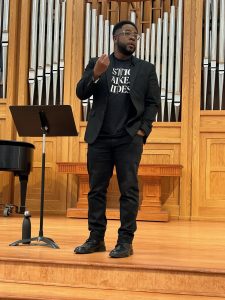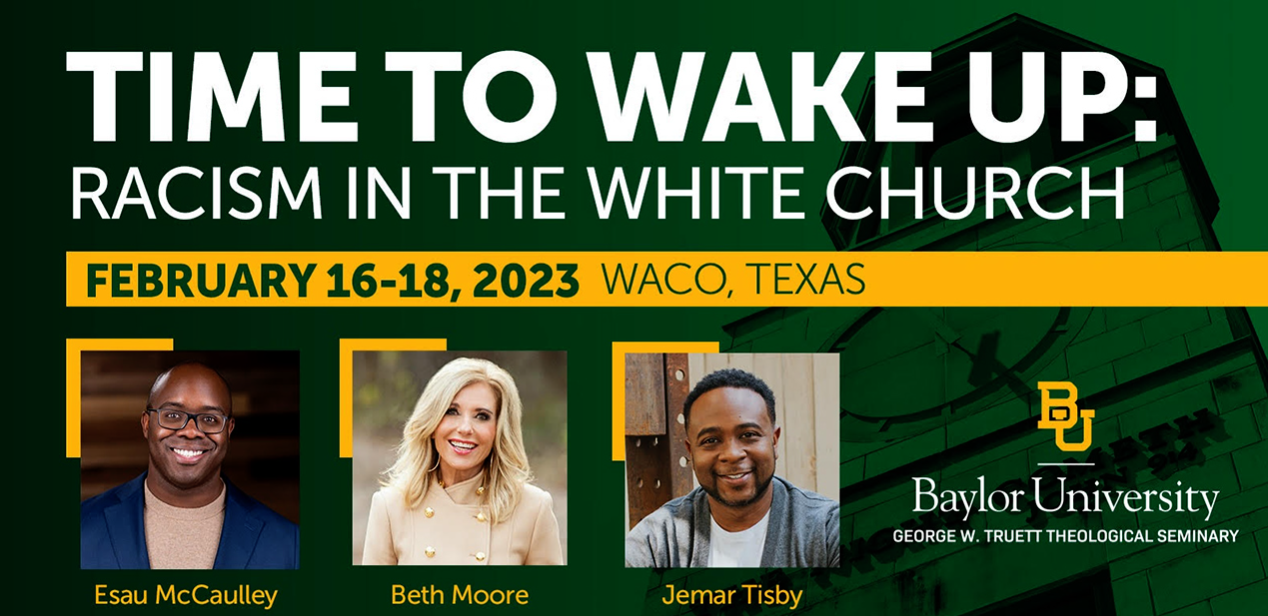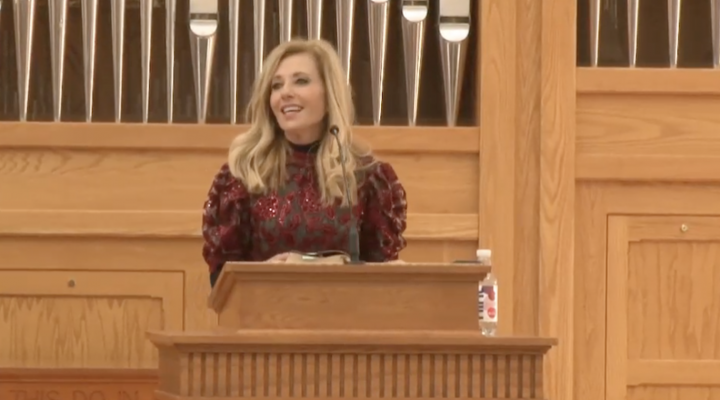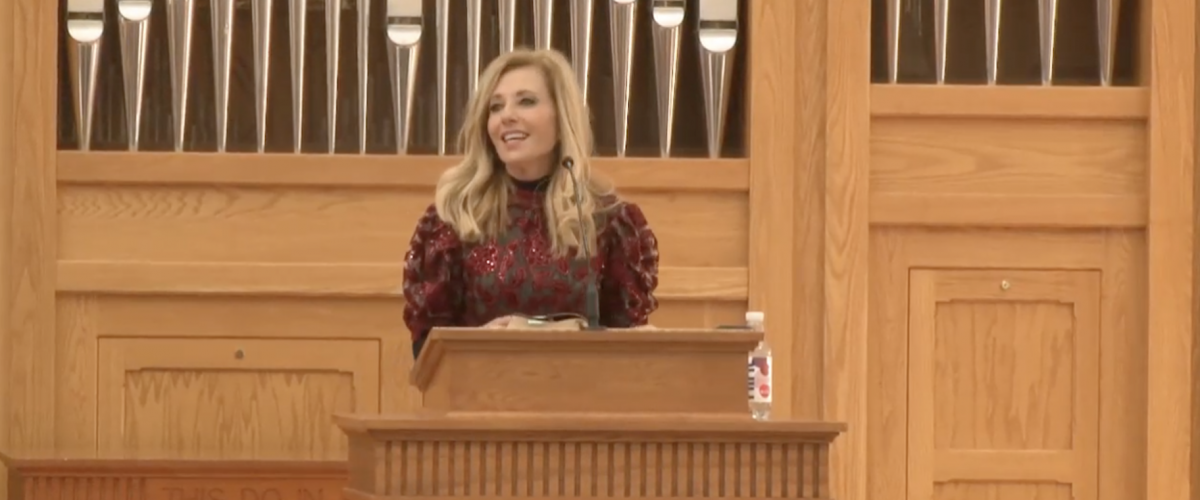White evangelicals who claim they love the Bible but dismiss its demands for social justice as devious misinterpretations of “woke” culture continue to astound Beth Moore, she told participants in a conference sponsored by Baylor University’s George W. Truett Seminary.
“This is the one place my frustration really comes through, because I don’t know how you come up with that. I don’t. I don’t even know how the math works. Because (social justice) is all over the Bible,” she said during “Time to Wake Up: Racism in the White Church,” held Feb. 16-18 virtually and on the Baylor campus in Waco, Texas.

Jemar Tisby
Moore, a popular Bible teacher and author, joined other keynote speakers, including Esau McCaulley, author of Reading While Black, and Jemar Tisby, a history professor at Simmons College of Kentucky and author of How to Fight Racism.
Moore became a lightning rod for evangelical rage before and since her departure from the Southern Baptist Convention in 2021 over her anti-racism teachings and decision to join the Anglican Church North America.
Frequently confessional and repentant, Moore acknowledged the attacks she has endured since she started protesting the politicization of evangelicalism and addressing racism in the white church and in her own life.
Moore admitted to “a learning curve that is embarrassing,” noting it began when she was fully embedded in “a white church and white thinking.”
“I need you to think of me in this journey toward anti-racism as a middle schooler at best, pimple-faced with braces and extremely awkward and sometimes giggly,” she said. “I need you to go to all those places with me and know that I have just begun my own journey.”
Moore admitted to “a learning curve that is embarrassing,” noting it began when she was fully embedded in “a white church and white thinking” growing up Baptist in Arkansas in the late 1950s and 1960s.
While welcoming the diversity that came with school desegregation and yearning for it in church, Moore said she assumed the white-centric hierarchy of American society is beneficial for white and Black people alike. “I was in a very privileged part of the world and a very privileged part of the church,” she conceded.
Awareness of her privilege began to dawn on her just over a decade ago, she said, noting, “If I were to nail it down to a time, it would be the murder of Trayvon Martin in 2012.”
George Zimmerman shot and killed Martin, a 17-year-old African American, in Samford, Fla., as Martin walked through a predominately white neighborhood. A jury acquitted Zimmerman, even though Martin was unarmed.
“Perhaps many of you would peg that same moment as a turning point, followed by one murder after another,” Moore said. “And we watched the church … remain defiantly silent.”
The next major shift came with the presidential campaign of 2016, which ushered in “a political divisiveness the likes of which I’ve never seen” and an evangelicalism that was “completely unrecognizable,” she added. “What became increasingly and startlingly clear was that our politics informed our faith, rather than our faith informing our politics. We can’t even see it.”
“I have been so much nicer on Twitter than I wanted to be. What I want to say is: ‘You’re not reading your Bible. You’re not reading the very Bible that you’re quoting.’”
Moore has held back from fully speaking her mind on these issues via social media, she said. “I have been so much nicer on Twitter than I wanted to be. What I want to say is: ‘You’re not reading your Bible. You’re not reading the very Bible that you’re quoting.’”
Christians who do cite biblical passages of mercy and justice for the marginalized get branded as progressives, she said.
“What I’m going to tell you is this: You cannot read the Bible through and through … and get to the end of it and think that justice is not a social matter that is of great gospel importance to God,” Moore insisted.
Fear lies at the core of the racism in church and society, as well as at the core of “the marriage between white evangelicals and Republicanism,” she added. “Fear was a core value in my home (growing up), and it’s also a core value in this country, and, God help us, it is a core value of the church. If you want to control us, tell us everything is a threat and everything is a slippery slope.”

Also slippery is the racism often inherent in the white evangelical desire for congregational diversity, Moore said.
“Believe me when I tell you that unity can be used by the white Church as a weapon, as a way to manipulate — for all of us to get along,” she acknowledged. “And this was me. It hit me between the eyes.”
But subtle racism typically escalates into overt expressions when Black Christians seek any degree of agency or leadership in white spaces, Moore observed.
“What we want is for you to come into our space so that we can be in control of it,” she said. “As long as we can control the narrative, oh listen, the more different the better. But just make sure you sound like us.”
“You don’t have to be a skinhead to be a white supremacist. … All we have to do is believe, perhaps somewhere even down deep within us, that we are better, that white is brighter and that we are best in charge.”
Many people are surprised racism can be nuanced, she said. “You don’t have to be a skinhead to be a white supremacist. I know that’s going to be a shock to somebody. But you don’t. All we have to do is believe, perhaps somewhere even down deep within us, that we are better, that white is brighter and that we are best in charge.”
White evangelicals must embrace the discomfort and pain that can come with self-examination, Moore urged, noting failure to do so produces immense moral and spiritual consequences for individuals and the church.
“One of the greatest tragedies is that we — people like me — devalue the depth of intimacy of Christ that generations of African Americans forged through suffering, yet we were arrogant enough to think they have nothing to teach us.”
Related articles:
Why Beth Moore’s departure from the SBC really matters
Now Beth Moore is taking on patriarchy in the church


